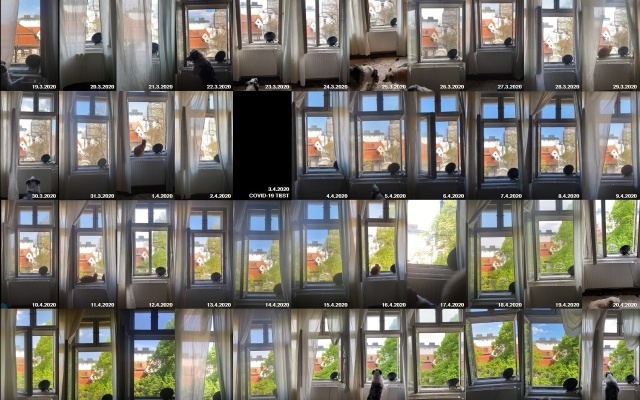Every day at noon we placed a speaker onto a windowsill directed towards the exterior of the Slovenian government building across the street. Like a civil defense siren tone, we loudly played a 90-second sound byte of the “Internationale” – the anthem of mobility in times of immobility. This action had parallels with Federico Fellini's Amarcord, where in 1930s Italy a gramophone wired on the town church campanile, plays a recording of the Internationale, but is soon shot down by Fascists.
In addition, the sound of the Internationale caused two dogs and a cat living in our house to react too. They would get aroused by the action and jump on the windowsill while the anthem was being played.
They evoked a correlation to the Russian avant-garde that compares proletarians to animals as important contributors to the production of freedom.
This activity started on the 19th of March 2020, when only three days after enforcing a strict lockdown, the Slovenian government announced that they would raise the salaries of ministers and state secretaries by 30%, while all other solutions of solidarity concerning the rest of civil society had not been solved at all. Our 44-day-long activity ended on the 1st of May (Labor Day) celebrated each year as a national holiday of laborers and working classes. In Slovenia, this celebration is usually accompanied by festivities like setting up maypoles, picnics, or gatherings with family and friends as well as nature trips. Instead, this year, thousands of people broke out of lockdown to cycle through Ljubljana and protest against the government for using the coronavirus pandemic as a pretense to restrict freedoms, attempting to increase police powers, inflame hatred against migrants, and launching personal attacks on civil society, as well as inserting clauses into emergency legislation to block NGOs from consultations about construction projects that severely compromise nature.
In this respect, we drew further inspiration from the whole situation by Oxana Timofeeva’s book titled The History of Animals: A Philosophy (2018), where she writes the following: the animal kingdom serves as a kind of model of a society that should be transformed. It is not a matter of the predominance and superiority of one species over another, but a matter of taking everything into account. In so far as inequality between species remains untouched, the equality of people, too, can never be achieved.
In the second half of March, the Confederation of Museums L’internationale, as part of the Artists in Quarantine project, invited about a dozen international artists to establish their vision of current living and working conditions through works of art. Smrekar decided to address the Slovenian artist’s view with the work she and her collaborators were creating and documenting every day. From one of the resulting video documentaries, Smrekar created a video titled Internationale, Day 4. The video has since been posted on the L’internationale and its affiliated members’ websites; seven European institutions in the field of modern and contemporary art: Modern Galleries (MG + MSUM, Ljubljana); Museo Reina Sofía (Madrid, Spain), whose online platform has counted more than 15,000 video views of Internationale, Day 4; MACBA Museu d’Art Contemporani de Barcelona (Spain); Museum van Hedendaagse Kunst Antwerp (MHKA, Antwerp, Belgium); Muzeum Sztuki Nowoczesnej w Warszawie (Warsaw, Poland); SALT (Istanbul and Ankara, Turkey); and Van Abbemuseum (VAM, Eindhoven, The Netherlands).
BIO
Maja Smrekar’s work in the international art and science milieu concerns interdisciplinarity research into the ideological structures of society. Her practice has allowed her to lead collaborations in developing cross-conceptual productions that include performances, installations, site specific art, drawings, videos, sound, as well as contributions to knowledge exchanged within lectures, talks, and texts. She has been a guest professor at the Academy of Fine Arts and Design, Ljubljana, Slovenia; Faculty of Fine Arts, Belgrade, Serbia; Interface Culture Lab, University of Art and Design, Linz, Austria; and Academy of Arts, Architecture and Design in Prague, Czech Republic. For various years she has been an artistic associate of production platforms, such as Kapelica Gallery / Kersnikova Institute (SI), The Culture Yard (DK), Cultivamos Cultura (PT), Quo Artis Foundation (ES), Aksioma Institute (SI), etc.
Smrekar has collaborated at festivals Ars Electronica (Linz, Austria), Click festival (Elsinore, Denmark), Transmediale (Berlin, Germany), Rencontres Bandits-Mages (Bourges, France) and Musrarra Mix (Jerusalem, Israel), as well as in fine arts and media arts museum contexts such as ZKM Karlsruhe (Germany), Musée de l`Homme (Paris, France), MAK Vienna / Vienna Art Week (Austria), Het Neuwe Institut (Rotterdam, The Netherlands), Museum of Contemporary Art Metelkova (Ljubljana, Slovenia), Latvian National Arts Museum (Riga, Latvia), Milton Keynes Gallery (United Kingdom), RMIT Gallery Melbourne (Australia). In 2018, she was invited as a freedom of expression promoter by Equal Opportunities for Women and became a member of the Slovenian PEN center (part of PEN International). Maja Smrekar lives and works in Ljubljana, Slovenia.
*Cover photo: Maja Smrekar, Internationale, 44 days. Courtesy of the artist.



